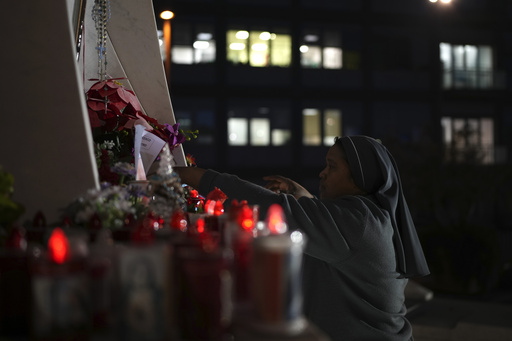ROME — Pope Francis is in a critical state as of Saturday following a serious respiratory crisis related to his asthma that necessitated significant oxygen support, as reported by the Vatican. The 88-year-old pontiff has faced a week-long hospitalization due to pneumonia coupled with a complex lung infection. According to the Vatican’s recent update, he has also undergone blood transfusions owing to low platelet counts associated with anemia.
The Vatican’s statement highlighted that Francis’ health remains critical, marking the first instance where the term “critical” has been formally used to describe his condition. “The Holy Father’s condition continues to be critical, and as explained yesterday, he is not out of danger,” the update noted. While the pontiff reportedly remains aware and spent the day in an armchair, he is experiencing more discomfort than previously. At this time, his prognosis is uncertain, necessitating continual observation.
Medical professionals have indicated that Francis’ health is precarious, with his primary risk being the potential development of sepsis, a severe complication arising from pneumonia that infects the blood. Fortunately, as of Friday, there were no signs of sepsis, and he is responding well to the treatment regimen established by his medical team, which includes various medications.
Pope Francis, who has a history of chronic lung issues, was first admitted to the Gemelli hospital on February 14 after his bronchitis worsened. After extensive testing, he was diagnosed with a complicated respiratory infection that includes viral, bacterial, and fungal elements, along with pneumonia affecting both lungs. His treatment plan includes “absolute rest,” a mix of antibiotics and cortisone, as well as supplemental oxygen as necessary. The Vatican acknowledged that he experienced a prolonged asthmatic respiratory crisis that required high-flow oxygen for the first time in its latest communications.
Dr. Sergio Alfieri, who leads the medical team at Gemelli hospital, expressed concern over the risk that infectious agents from Francis’ respiratory tract could enter his bloodstream, potentially leading to sepsis, which can be life-threatening, particularly given the Pope’s advanced age and respiratory complications. “With his respiratory issues and age, sepsis would be a very difficult battle,” he stated during a news briefing.
In light of the Pope’s critical health status, speculation surrounding a possible resignation has surged. Vatican officials are taking measures to dispel rumors around this issue, as there are no established guidelines for what occurs if a pope becomes unable to govern. Pope Francis himself has previously mentioned that he drafted a resignation letter, should such a situation arise. Nevertheless, he remains fully aware, engaged, eating, and working as he recovers.
Cardinal Pietro Parolin, the Vatican’s secretary of state, recently addressed the conjecture in an interview, emphasizing that it is important to focus on the Pope’s recovery rather than entertain unfounded speculations about resignations. Parolin described such rumors as “useless,” affirming that the primary concern should remain on the health and recovery of Francis, who is participating in the Vatican’s ongoing Holy Year celebrations.
Deacons were present at the Vatican for a special weekend gathering, with plans to celebrate the ministry that precedes priestly ordination, a role Francis was expected to bless but will be represented instead by the Holy Year organizer due to his health. For the second Sunday in a row, the Pope will not conduct his usual public blessing, which he might have offered from the hospital if he was able.
Despite his physical absence, deacon Luis Arnaldo López Quirindongo from Ponce, Puerto Rico, expressed that the Pope’s spirit remains with those in attendance as they come together to celebrate the occasion, underscoring that his support and prayers continue. “Though he is not here physically, he is present in our hearts and accompanying us as our prayers align with his,” he remarked.
